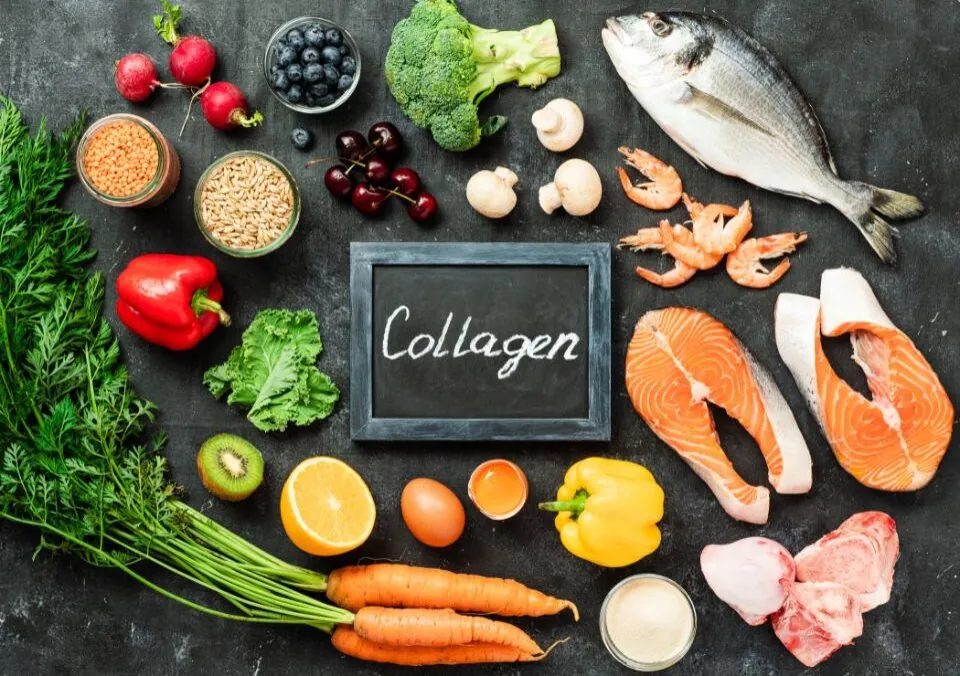Blog
The Scoop on Collagen

In recent years, the popularity of dietary supplements has surged, with collagen often taking center stage. It’s not merely a trend; there is solid science behind the benefits of collagen for our bodies. This comprehensive discussion will dive deeper into what collagen is, its multifaceted roles in human health, the effects of aging on collagen production, and the various dietary sources we can choose to incorporate into our lives.
Understanding Collagen
First, let’s break down what collagen is. Collagen is a type of protein that is crucial to the structure of your body. It is the most abundant protein in mammals, accounting for about 30% of the total protein content. According to registered dietitian Jillian Kubala, collagen forms the scaffolding for our connective tissues, tendons, ligaments, bones, skin, and cartilage. This structural protein is composed of three amino acids: glycine, proline, and hydroxyproline, which together create a triple helix structure pivotal for stability and strength.
The Importance of Collagen
Collagen is essential not only for maintaining skin elasticity but also for various critical functions in our body that are often overlooked. According to Kubala, these functions include:
- Tissue Repair: Collagen helps to heal wounds and replenish our tissues. It’s an integral part of the healing process and helps in repairing damaged tissues.
- Immune Response: Collagen plays a role in the complex immune response by providing structural integrity to tissues that combat infections and inflammation.
- Cell Communication: Collagen molecules can interact with cells, signaling them to perform necessary functions and aiding in maintaining healthy tissues.
- Cell Migration: This process is vital during wound healing, where cells move to the site of injury to repair damaged tissue.

The Aging Factor
As we age, collagen production slows down. A review on collagen supplementation highlighted that starting around age 30, collagen levels decrease at a rate of about 1% per year. This decline can lead to signs of aging such as wrinkles, joint pain, and decreased skin elasticity. Additionally, factors such as excessive smoking, alcohol consumption, and UV exposure can accelerate this decline in collagen production, leading to diminished structural support in our tissues.
The gradual loss of collagen can manifest in various ways:
- Skin Changes: Reduced collagen can lead to wrinkles, sagging skin, and a rough texture. Hyaluronic acid often works in conjunction with collagen and starts to deplete too, further contributing to a dull appearance.
- Joint Issues: Joint cartilage is highly collagenous. As collagen levels drop, one might experience increased pain and stiffness, and the risk of osteoarthritis can rise.
- Weakened Hair and Nails: Collagen contributes to the strength of your hair and nails. When collagen levels dip, you might notice increased brittleness or thinning.
Sources of Collagen
The good news is that there are numerous ways to boost our collagen levels through diet and supplementation. There are two primary routes to obtain collagen: directly through collagen-rich foods and indirectly through foods that promote collagen production.
Collagen-Rich Foods
- Bone Broth and Marrow: One of the most traditional sources of collagen is bone broth, made by simmering animal bones. The slow cooking process extracts collagen, amino acids, and minerals, which contribute to its health benefits. Bone broth has been praised for its gut health properties as well.
- Meats with Skin On: Consuming meats with skin, such as chicken skin, can provide a substantial amount of collagen.
- Jellyfish: Although less common in Western diets, jellyfish is recognized in some cultures as a nutritious source of collagen.
- Fish Skins: Fish, particularly those with their skin and bones intact, are excellent sources of collagen. Not only are these parts rich in protein, but they are also often packed with omega-3 fatty acids, beneficial for heart health.
Foods That Promote Collagen Production
- Beans: Plant-based sources of protein like beans provide essential amino acids and also contain certain minerals like copper, which aid in collagen synthesis.
- Fish: Fatty fish are inherently high in omega-3 fatty acids, which can help boost collagen production along with promoting skin health.
- Poultry: Chicken, especially its skin and cartilage, is a solid source of collagen.
- Eggs: Eggs are rich in amino acids and crucial vitamins that contribute to collagen production—making them a fantastic source for anyone looking to boost their intake.
- Citrus Fruits: Vitamin C is notorious for its role in collagen synthesis. Citrus fruits like oranges, lemons, and limes provide a fresh way to increase the body’s ability to produce collagen.
Collagen Supplements
In addition to food sources, collagen is commonly available in supplement form, offering a convenient way to ensure adequate intake. Collagen powders, pills, and even beverages infused with collagen are widespread in the market today. Adding a scoop of collagen powder to your morning coffee or smoothie can be an easy way to integrate collagen into your routine.
Several studies have suggested that collagen supplements may improve skin elasticity, hydration, and even reduce the appearance of wrinkles. A randomized controlled trial reported by Healthline found that women who supplemented with collagen displayed improved skin elasticity and hydration after eight weeks.
How to Maximize Collagen Absorption
To reap the full benefits of collagen, consider the following tips to maximize absorption and efficacy:
- Pair Collagen with Vitamin C: Including Vitamin C-rich foods, such as berries or leafy greens, with collagen sources enhances the body’s ability to produce more collagen.
- Maintain a Balanced Diet: Including a variety of other nutrients like zinc and copper found in nuts, seeds, and whole grains can support the synthesis and stability of collagen.
- Stay Hydrated: Proper hydration is crucial. Water helps maintain tissue health and can prevent collagen degeneration.
- Adopt a Healthy Lifestyle: Quitting smoking, reducing alcohol consumption, and limiting sun exposure can reduce collagen loss, promoting a healthier appearance.
Potential Risks and Considerations
While collagen supplements are generally considered safe, there are some aspects to be mindful of:
- Allergic Reactions: If you have shellfish allergies, be cautious with marine collagen products, which are often derived from fish and shellfish.
- Quality and Source: Not all collagen supplements are created equal. It is important to choose high-quality products from reputable brands. Look for certifications or third-party testing to ensure purity and efficacy.
- Dietary Restrictions: For those following strict vegetarian or vegan diets, traditional collagen sources are not suitable. Plant-based alternatives that promote collagen production, like those mentioned above, may be a better fit.
Conclusion
Collagen is indeed a powerhouse protein critical for maintaining the structure and integrity of our bodies. With its essential roles in tissue repair, immune response, and overall skin health, understanding how to effectively incorporate collagen into your life is crucial.
By recognizing the various sources of collagen—both through food and supplements—you can make informed decisions about how to support your body as it ages. So, whether you choose to sip bone broth, enjoy a fish dish, or opt for a collagen smoothie, you are contributing positively to your collagen levels, promoting not just healthier skin, but overall wellness.
For more health-related discussions and articles, I recommend checking out the Fill Your Plate blog. Stay informed and take charge of your health with the right knowledge and practices!
By Heide Kennedy, Arizona Farm Bureau Communications Intern


















